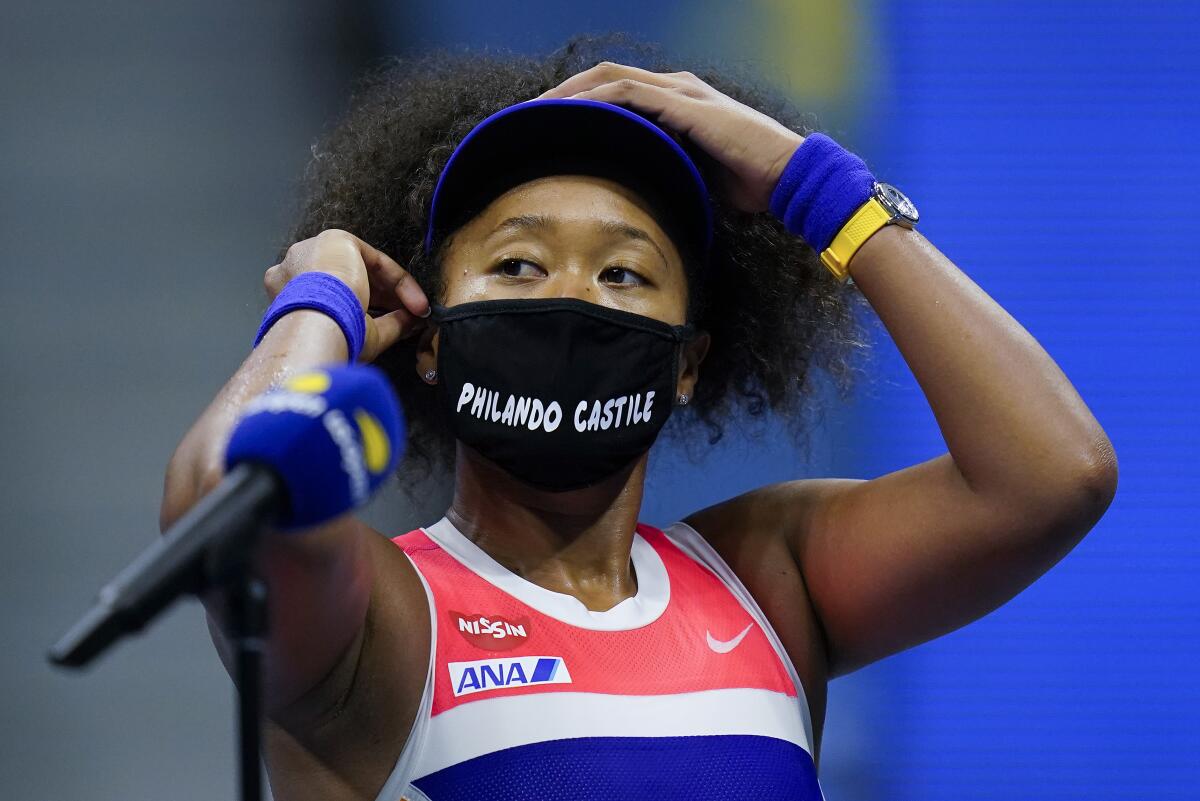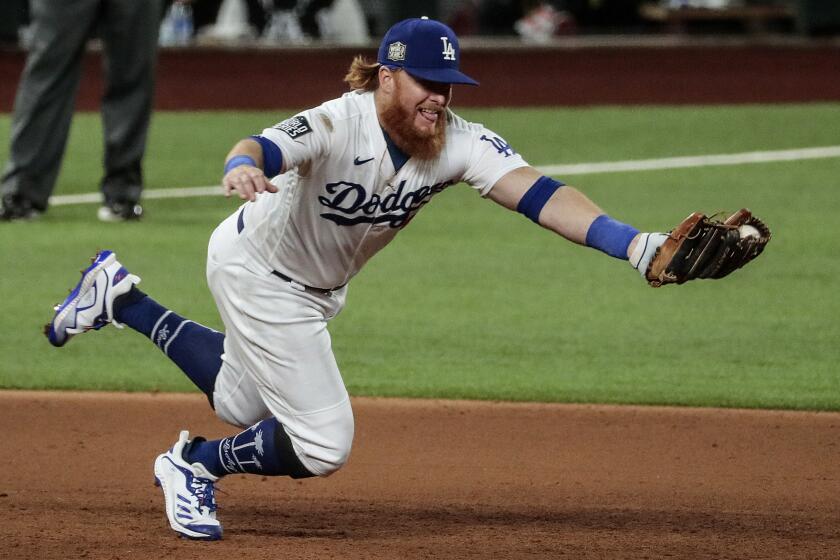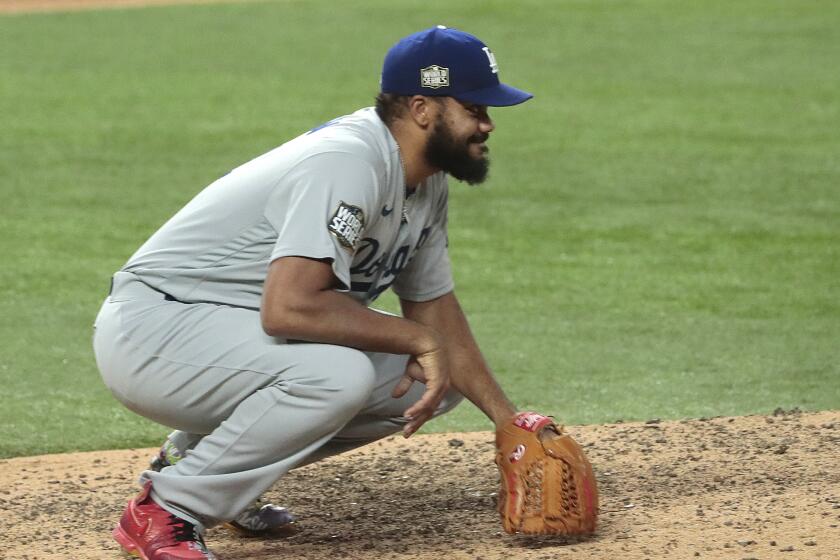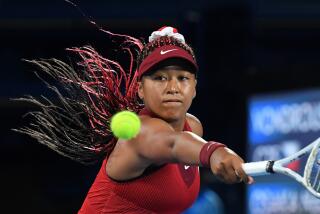‘Something bigger than winning’: In 2020, athletes stood up and spoke out

- Share via
Seven names. Seven masks. Seven matches.
That was tennis player Naomi Osaka on her way to winning the U.S. Open championship in September. In each of her matches, she wore a mask bearing the name of a different victim of police violence or citizen vigilantism.
“I learned that change can only come when you put fear aside and speak up for things that matter,” Osaka said in an interview with The Times. “I was also really honored to be able to show up to each match speaking to the police brutality faced by Black Americans.”
It was a tough year for all of us, and athletes were no different, having to cope with interrupted seasons and bubbles. But it wasn’t all ugliness for athletes in 2020. It was also the year that more of them found their voice.
Osaka played her matches, appropriately for the year, in the Arthur Ashe Stadium at the Billie Jean King National Tennis Center, facilities named in honor of a pair of tennis icons known for using their platforms to fight injustice. Not far outside the stadium, protesters marched against systemic racism. Inside, Osaka’s masks brought the spirit of the protests to the court.
Dodgers manager Dave Roberts spoke to reporters via video to discuss players’ futures such as third baseman Justin Turner and pitcher David Price.
Breonna Taylor. Elijah McClain. Ahmaud Arbery. Trayvon Martin. George Floyd. Philando Castile. Tamir Rice. Each life was honored, each horrific death mourned on Osaka’s simple black masks.
By stringing them together over the course of the tournament, Osaka reminded those who watched her matches not only of the individual deaths but of their frequency. They are not “tragedies” or “unfortunate incidents” or any other euphemism suggesting that the death of yet another unarmed Black person can be an anomaly. No, the infliction we endure is constant and inhumane, and virtually every sport stepped forward to say so.
The Year in Review
Even after getting a league agreement on social justice messaging and resources directed to underserved communities, NBA players refused to play in August, after video went viral of Jacob Blake being shot multiple times in the back by Kenosha, Wis., police.
Players in other sports, too, used their platforms to speak of the pain in an effort to save lives. Even the Dodgers’ usually reserved Clayton Kershaw spoke out, joining Mookie Betts and David Price, en route to the franchise’s first championship since 1988.
Osaka, Kershaw, Betts, LeBron James, Maya Moore and so many other athletes spent 2020 reminding America that Black lives matter. And they made clear that no profession can insulate a person from racism’s tentacles. We saw world-class athletes, who used to keep their rage and despair under wraps, not only taking to the streets to march but finding ways to leverage their platforms, resources, fame and gifts to broadcast the conversation.
“I realized that I was fighting for something bigger than winning the Open,” Osaka said. “That in itself gave me more energy to compete, which probably showed in my play.”
The year held trials, she said, but speaking out “felt like something positive during a difficult time for so many.”
Kenley Jansen is no longer an elite closer. The Dodgers have to find a solution and have the remainder of the winter to figure out how.
The athletes’ efforts have drawn detractors, of course, including President Trump. But the disingenuous choruses of “stick to sports” — as if race and sports have ever been separate issues — rang particularly hollow this year. We can pretend that Black athletes decrying racism is the problem. Or we can listen to what they’re saying and think about the issues they raise.
Doing so might bring the realization that Jackie Robinson Day exists for a reason. That the Rooney Rule and Title IX and LGBTQ support organizations such as You Can Play and Athlete Ally all were born from injustice.
If Osaka had not won the U.S. Open, her statement would not have been diminished. But her messages, along with those of the Lakers, the Dodgers, Formula One legend Lewis Hamilton and others, were all the more powerful and difficult to ignore because they hoisted trophies. Winning can’t solve the world’s problems, but it can sometimes shut the haters up while solutions are being crafted.
With each mask, Osaka challenged the country to do better. With each victory, she proved that making such demands did not hurt her on the court. And with each name, we were painfully reminded that racial unrest did not begin in 2020; this was just the year it came into focus.
More to Read
Go beyond the scoreboard
Get the latest on L.A.'s teams in the daily Sports Report newsletter.
You may occasionally receive promotional content from the Los Angeles Times.













